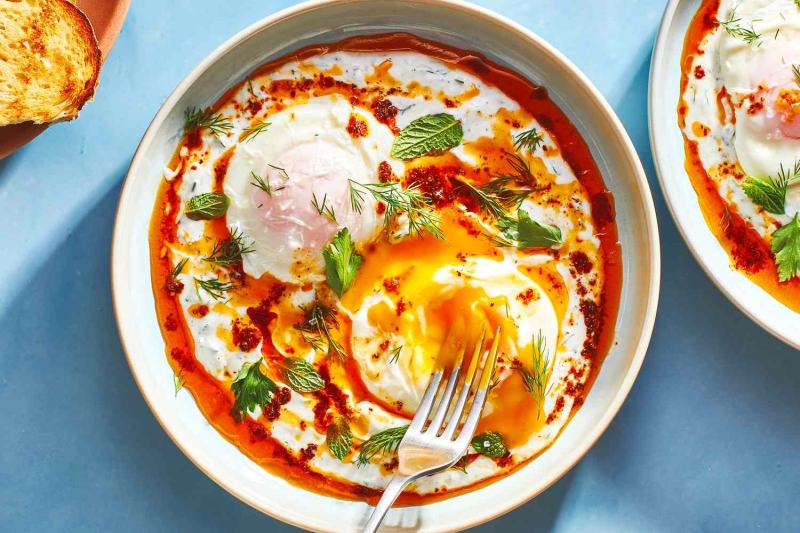Prep: 15 mins
Cook: 12 mins
Total: 27 mins
Servings: 2 servings
Rooted in tradition and packed with soothing flavors, this dish will soon be your (and your loved ones’) favorite. It’s the egg dish that proves eggs are welcome at any meal of the day. I was introduced to this dish while cooking along the Mediterranean and it quickly became my go-to for serving as an elevated brunch or treating myself when I needed a little comfort. I love how easy it is to prepare while still bringing the wow factor, especially when I have a big group to feed.
What is Çilbir?
Çilbir, pronounced chil-burr, is one of the most popular breakfast recipes in Turkish cuisine. It’s simply poached eggs over a bed of garlicky yogurt drizzled with a spiced butter sauce. Make sure to use Greek yogurt versus simply a plain yogurt because you want it to be a thick spread for the base of the dish. I don’t see a big difference in using full-fat over fat-free yogurt other than you will get a richer mouthfeel from full-fat. Just make sure it’s Greek! You could even use labneh thinned out with a bit more lemon juice.
For the sauce, some use olive oil or a mix of olive oil and butter, but the traditional recipe calls for a rich spiced butter. Butter offers a rich mouthfeel and we take it a step further by cooking it until the milk solids become toasted, aka brown butter or beurre noisette.
Aleppo pepper or pul biber, a red chili flake common in the Middle East, is the key ingredient in the butter. It’s more mild than the red chili flakes common in North America with earthy undertones and a slight sweetness. Its presence serves to add layers of flavor rather than heat, but you can add more if you want a spicier variation.
How to Serve Çilbir
While there’s plenty going on in this dish, I love to complete the meal with a side of toasted bread. It’s the perfect vessel to scoop up every last delightful drop of eggs, yogurt, and butter. Look for simit, pide, Turkish bagels, or a sourdough at your local bakery. I suggest slightly heating the bread in the oven to soften it.
The one thing I ask of you: don’t skimp on the dill. You can use a mixture of herbs to top çilbir, but dill is key. It not only leans into the tradition of this dish, but its citrusy and slightly sweet, earthy undertones make it a dreamy pair to the tang and spice of surrounding flavor notes.
“For those of you looking to really spice up your morning eggs. As an egg fanatic myself I can’t recommend these more. Even though there are three separate components, it’s easily worth it.” —Noah Velush-Rogers
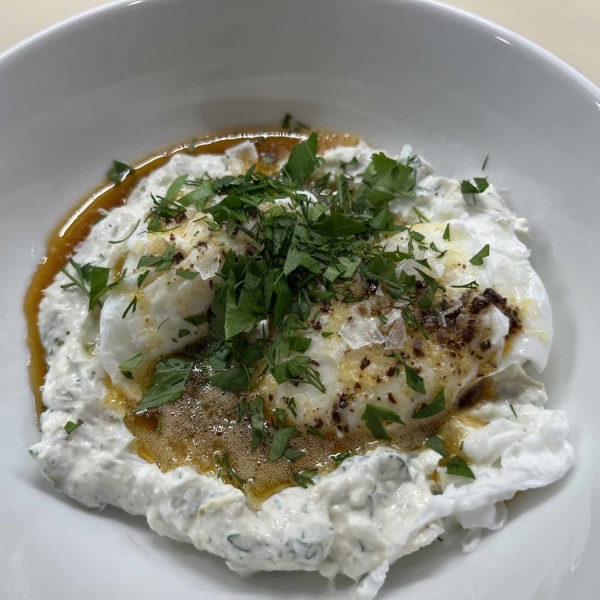
A Note From Our Recipe Tester
Ingredients
For the Yogurt Spread:
-
1 cup plain greek yogurt, room temperature
-
1 clove garlic
-
1 teaspoon lemon zest
-
2 teaspoons fresh lemon juice
-
2 tablespoons coarsely chopped fresh dill
-
1/4 teaspoon fine salt
-
1/2 teaspoon ground black pepper
For the Spiced Butter Sauce:
-
4 ounces (1/2 cup) unsalted butter, cut into pieces
-
1 tablespoon ground Aleppo chili pepper
-
1/4 teaspoon ground cumin
For the Poached Eggs:
-
1 tablespoon white vinegar or lemon juice
-
4 large eggs
-
Fresh herbs, such as dill, mint, or parsley, for serving
-
Flaky sea salt, for serving
-
Turkish bagels or bread, for serving
Steps to Make It
-
Gather the ingredients.
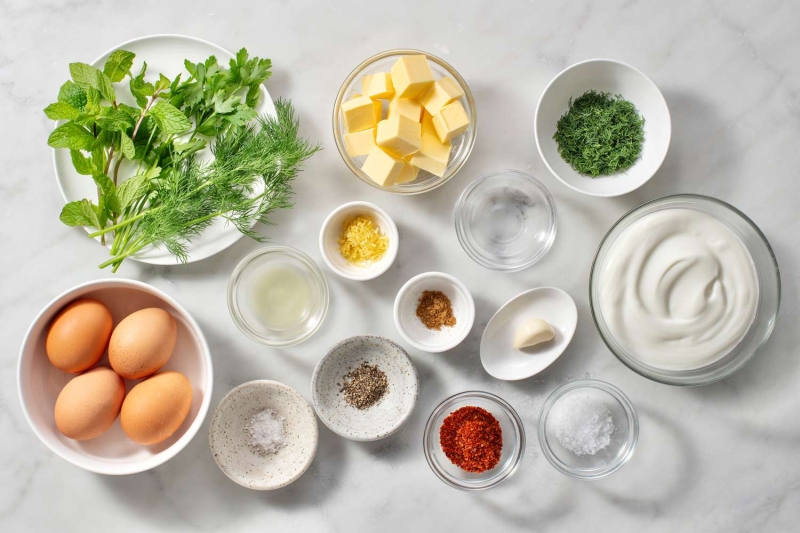
-
Make the yogurt spread: Place the yogurt in a medium bowl. Grate the garlic directly into the yogurt. Add the lemon zest, juice, dill, salt, and pepper. Stir to combine. Set aside.
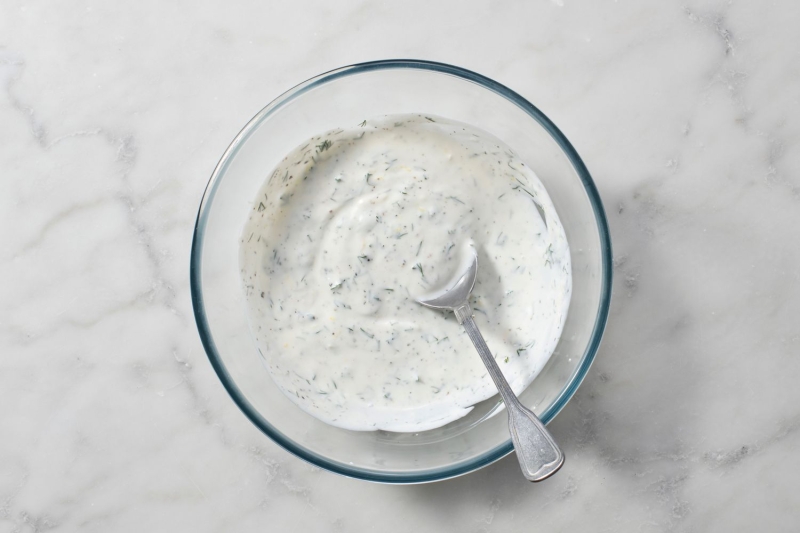
-
Make the spiced butter sauce: Melt the butter in a small saucepan or skillet over medium-low heat, swirling the pan occasionally, until the butter turns light golden color and foamy, about 2 minutes.
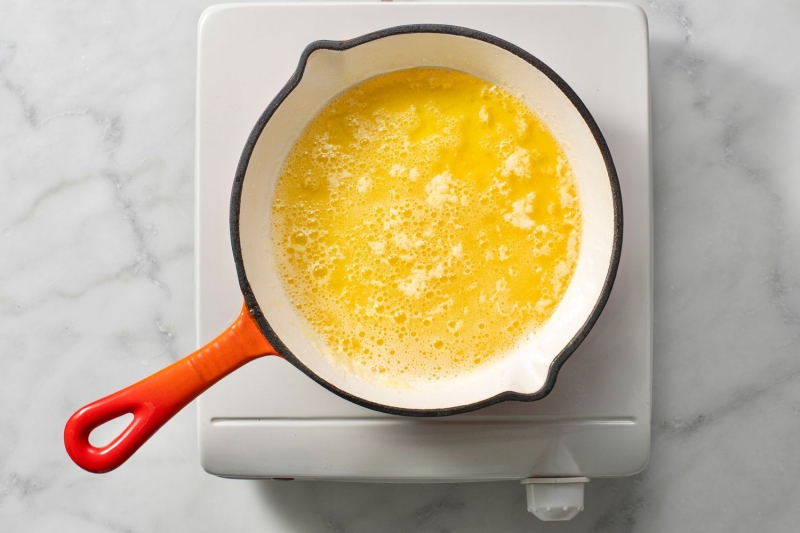
-
Continue to cook the butter until most of the bubbles subside, it smells nutty, and turns a light brown-hazelnut color, about 3 more minutes. Remove from the heat. Stir in the Aleppo pepper and cumin. Transfer to a bowl and set aside.
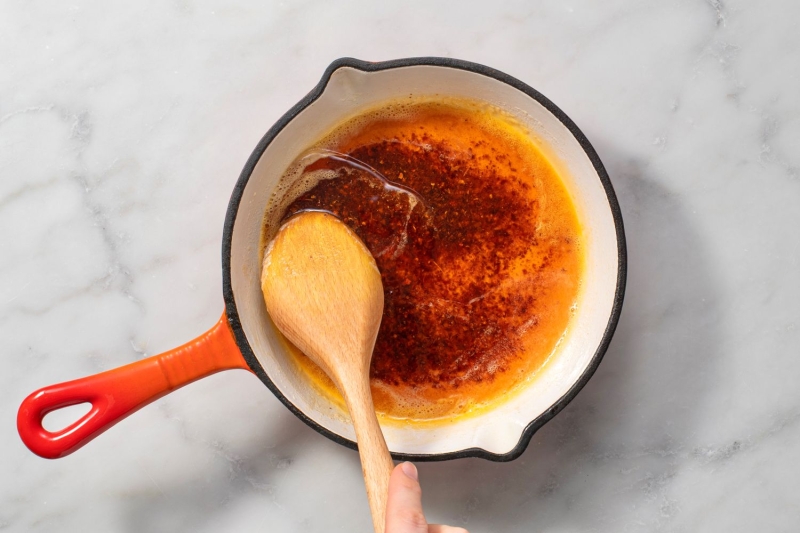
-
Poach the eggs: Bring a large pot of water to a boil over high heat. Stir in the vinegar. Reduce the water to a simmer (around 180 to 190 F).
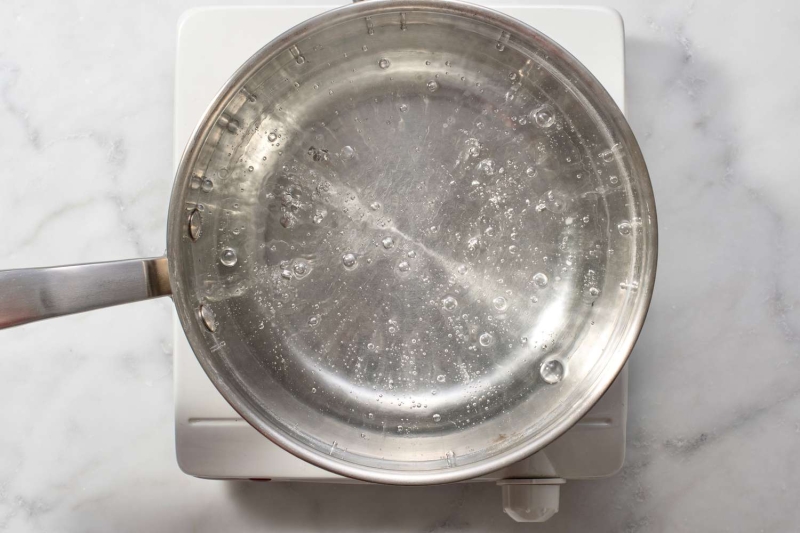
-
Crack an egg into separate small bowls, ramekins, or measuring cups. Gently lower the egg into the simmering water, holding the bowl just above the surface of the water to let the exterior of the egg set as it slides in.
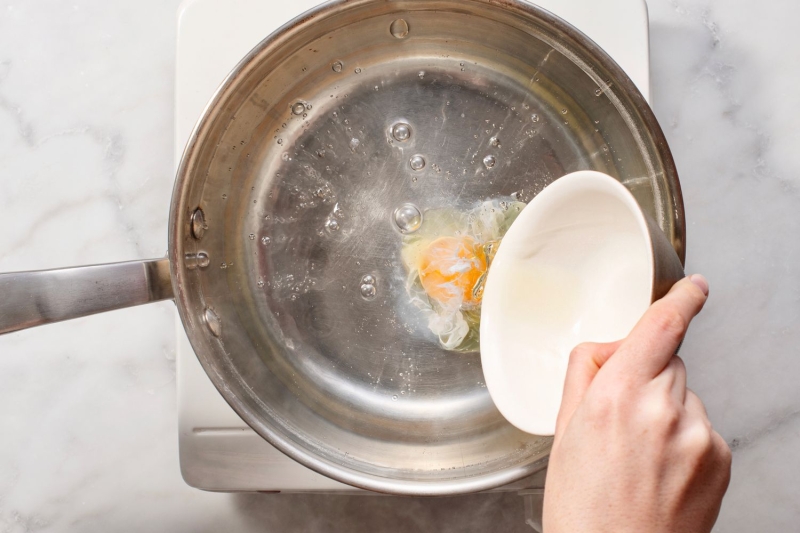
-
Poach until the whites are firm and yolk is set, but still soft, 2 to 3 minutes. Remove with a slotted spoon and transfer to a paper towel-lined-plate. Repeat with the remaining eggs.
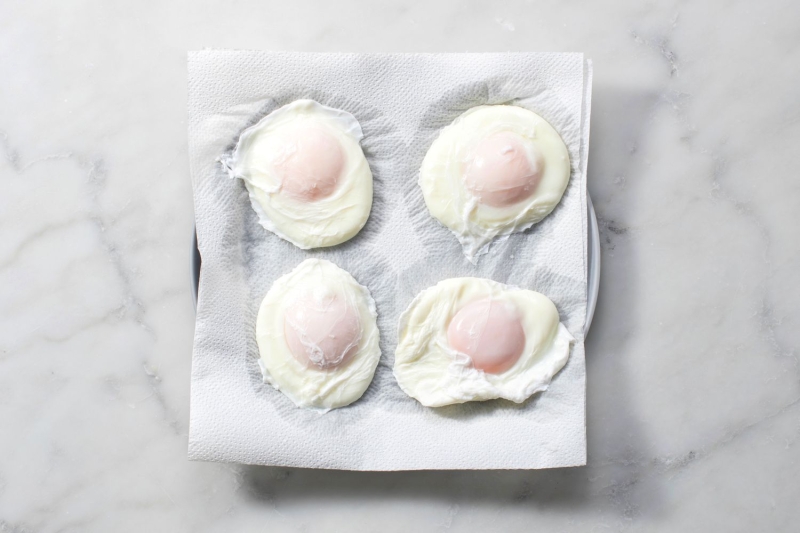
-
To assemble, divide the yogurt between two shallow bowls or plates, creating a well in the center. Place two poached eggs into each, then spoon as much of the spiced butter sauce over top as you like. Sprinkle with herbs and flaky sea salt. Serve with Turkish bagels or toasted bread to mop up all the flavors.
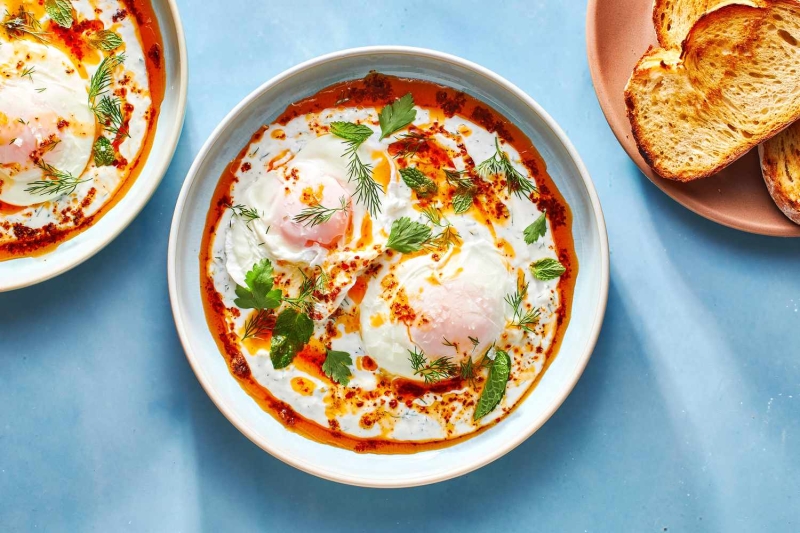
Recipe Tips
- Make sure your yogurt is at room temperature because cold yogurt will upset the warm, cozy vibes of the dish. If you don’t have time to bring it to room temperature you can gently heat it over a water bath, but be careful, as overheating the yogurt will cause it to curdle.
- Cutting the butter into pieces will help it melt and brown more evenly.
- Butter is easy to burn, so don’t walk away when making your sauce. You’re aiming for a light brown butter sauce—it will continue to cook and take on color once you remove it from the heat.
- A light-colored pan will help you see the butter more clearly as it takes on color.
- The addition of acid to the water helps the poached eggs hold their shape as they cook.
- Let the eggs come to room temperature before cooking as this makes cracking them easier.
- Cracking the eggs into a bowl or measuring cup before dropping them into the pot helps prevent eggshells from dropping in the water and you can gently lower the egg into the water to control its shape.
- The water should be simmering, not boiling when cooking the eggs. If the water is too vigorous it will break the eggs up. But if the water’s not hot enough, the egg might fall apart before it cooks.
- You can poach 2 eggs at a time, but no more as to avoid overcrowding.
Make Ahead
- You can make the yogurt ahead of time and store in an airtight container for up to 1 week. Take the yogurt out 20 to 30 minutes before serving the dish so that it can come to room temperature.
- We do not recommend making the butter sauce or eggs ahead of time as they will taste best the day of.
Recipe Variations
This is such a versatile dish to customize to your liking or your guests’ preferences. Use your favorite spices or additional ingredients you have on hand to spice things up even more:
- The yogurt should serve as a vibrant base to this dish, so avoid overpowering it with flavors. You could use a different citrus or herbs here.
- Feel free to use powdered garlic in the place of fresh garlic. Adjust the seasoning to your liking.
- While the poached eggs make this an elegant brunch option, I love making this with jammy soft boiled eggs because you get a little more texture from the set egg white, while still enjoying the sultry runny yolk.
- I love adding a hit of umami to the butter sauce, like bouillon powder, chopped anchovy or paste, miso, porcini powder, or even a splash of soy sauce.
- You can substitute 1/2 teaspoon red chili flakes mixed with 1/2 teaspoon paprika powder for the Aleppo pepper if you have trouble finding it in a grocery near you.
- Additional garnish options include toasted sesame seeds, chili crunch, feta, or cherry tomatoes (preferably tomato confit).
How to Store
This dish is best served immediately while everything is warm, so we do not recommend storing for later.
| Nutrition Facts | |
|---|---|
| Servings: 2 | |
| Amount per serving | |
| Calories | 905 |
| % Daily Value* | |
| Total Fat 57g | 74% |
| Saturated Fat 32g | 161% |
| Cholesterol 500mg | 167% |
| Sodium 1192mg | 52% |
| Total Carbohydrate 62g | 23% |
| Dietary Fiber 2g | 8% |
| Total Sugars 13g | |
| Protein 36g | |
| Vitamin C 14mg | 69% |
| Calcium 447mg | 34% |
| Iron 6mg | 35% |
| Potassium 482mg | 10% |
| *The % Daily Value (DV) tells you how much a nutrient in a food serving contributes to a daily diet. 2,000 calories a day is used for general nutrition advice. | |
